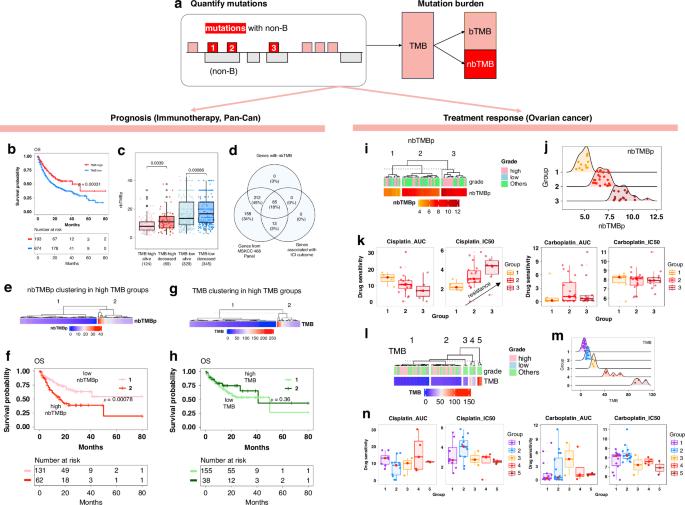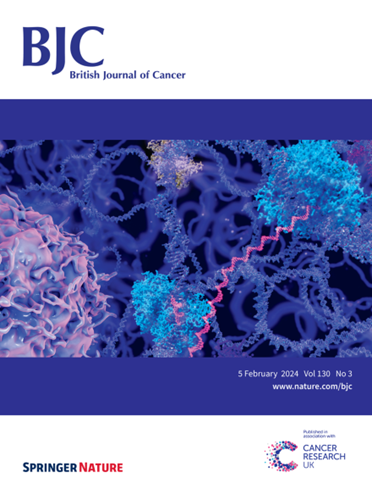Non-B DNA-informed mutation burden as a marker of treatment response and outcome in cancer
IF 6.4
1区 医学
Q1 ONCOLOGY
引用次数: 0
Abstract
Genomic instability is crucial in tumorigenesis, with Tumour Mutation Burden (TMB) being a biomarker to indicate therapeutic effectiveness, particularly in immunotherapy. However, TMB is not always a reliable predictor and displays heterogeneity. Non-B DNA, susceptible to mutations, play a significant role in cancer development, indicating their potential merit when combined with mutation for enhanced markers in cancer. We assessed mutations and non-B DNA interplay as biomarkers. Our methodology quantifies tumour mutations and their co-localization with non-B DNA, using survival and drug sensitivity assessments for clinical relevance. We introduce two novel markers, ‘nbTMB’ (non-B-informed tumour mutation burden) and ‘mlTNB’ (mutation-localised tumour non-B burden). In case studies: (1) nbTMB informs on survival heterogeneity among TMB-high patients undergoing immunotherapy whereas TMB is unable to further differentiate; (2) nbTMB informs on altered cisplatin sensitivity among ovarian cancer cell lines whereas TMB is unable to differentiate; and (3) mlTNB informs on survival heterogeneity among early-stage pancreatic cancer progressors in whom other markers of genomic instability fail to differentiate. These novel markers offer a nuanced approach to enhance our understanding of treatment responses and outcomes in cancer, underscoring the need for a comprehensive exploration of the interplay between non-B and B-DNA features.

作为癌症治疗反应和预后标志的非 B 基因突变负荷。
背景:基因组不稳定性在肿瘤发生过程中至关重要,而肿瘤突变负荷(TMB)是显示治疗效果的生物标志物,尤其是在免疫疗法中。然而,TMB 并不总是可靠的预测指标,而且显示出异质性。非 B 型脱氧核糖核酸容易发生突变,在癌症的发展过程中起着重要作用,这表明它们与突变结合在一起可增强癌症标记物的潜在价值:我们评估了突变和非 B 型 DNA 作为生物标志物的相互作用。我们的方法量化了肿瘤突变及其与非 B DNA 的共定位,并利用生存和药物敏感性评估临床相关性:结果:我们引入了两种新型标记物:"nbTMB"(非 B-信息肿瘤突变负荷)和 "mlTNB"(突变定位肿瘤非 B 负荷)。在案例研究中:(1) nbTMB 可以揭示接受免疫疗法的 TMB 高患者的生存异质性,而 TMB 无法进一步区分;(2) nbTMB 可以揭示卵巢癌细胞系对顺铂敏感性的改变,而 TMB 无法区分;(3) mlTNB 可以揭示早期胰腺癌进展者的生存异质性,而其他基因组不稳定性标记物无法区分这些进展者:这些新型标记物提供了一种细致入微的方法,可加深我们对癌症治疗反应和结果的理解,突出了全面探索非 BNA 和 B-DNA 特征之间相互作用的必要性。
本文章由计算机程序翻译,如有差异,请以英文原文为准。
求助全文
约1分钟内获得全文
求助全文
来源期刊

British Journal of Cancer
医学-肿瘤学
CiteScore
15.10
自引率
1.10%
发文量
383
审稿时长
6 months
期刊介绍:
The British Journal of Cancer is one of the most-cited general cancer journals, publishing significant advances in translational and clinical cancer research.It also publishes high-quality reviews and thought-provoking comment on all aspects of cancer prevention,diagnosis and treatment.
 求助内容:
求助内容: 应助结果提醒方式:
应助结果提醒方式:


